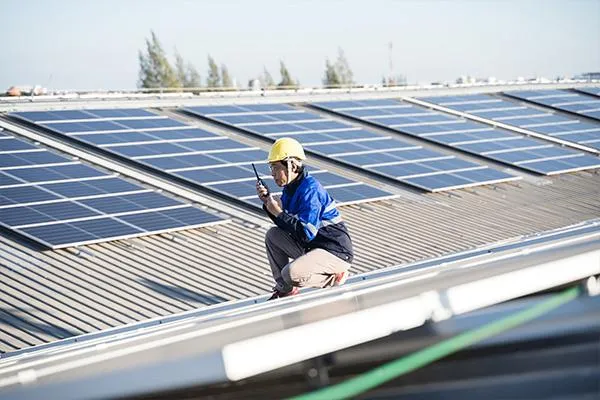
What You Need to Know Before Installing Rooftop Solar Panels
Hey there, Omaha! Have you ever considered rooftop solar panels? These devices, also known as photovoltaic panels, convert sunlight into electricity. They’re typically installed on rooftops and use semiconductor materials, like silicon, to generate power through the photovoltaic effect. The electricity produced by the panels is then sent to an inverter, transforming it into a form that can power your home.
Why Should You Consider Rooftop Solar Panels?
Rooftop solar panels offer numerous benefits:
Clean and Renewable Energy: Solar panels reduce your reliance on fossil fuels, helping to combat climate change.
Cost Savings: They can lower or even eliminate your electricity bills over time.
Increased Property Value: Studies suggest that homes with solar panel systems may have a higher resale value, but this can vary based on location and buyer preferences.
Energy Independence: With battery storage, solar systems can keep essential devices running during power outages.
Incentives and Rebates: While Nebraska has limited state-specific solar incentives, homeowners can benefit from federal tax credits and some local utility programs.
Assessing your home's suitability for rooftop solar panels
Before installing solar panels, assess whether your home is suitable:
Roof Direction and Angle: South-facing roofs receive the most sunlight throughout the day, making them ideal. However, east- or west-facing roofs can also be effective depending on energy usage patterns and panel efficiency.
Roof Pitch: Steeper roofs generally capture sunlight better.
Shade and Obstacles: Trees, buildings, or other structures that block sunlight can reduce efficiency. Ensure your roof is clear of obstructions.
Roof Condition: Older or damaged roofs may require repairs or replacement before installation.
Permitting Requirements: Check with local authorities and your homeowner's association for regulations.
Choosing the right solar panel system for your home

Types of solar panel systems available
If you're considering solar panels for your home, you might be wondering what type of system is best for you. Don't worry, we've got you covered! There are four main types of residential solar panel systems to choose from.
The first type is the grid-tied system, which is the most common and affordable option. This system connects to the electrical grid, allowing you to sell excess energy back to the utility company. It's an excellent choice if you want to take advantage of net metering policies. However, they will not function during power outages without battery backup.
The second type is the off-grid system, which is perfect for those living in remote areas or who want complete energy independence. This system requires batteries to store excess energy, which can add to the overall cost.
The third type is the hybrid system, which lets you switch between grid-tied and off-grid modes depending on your energy needs. It includes a battery backup and is great for homeowners who want backup power during outages.
Finally, there's the community solar system, which is ideal for those who can't install solar panels on their own property. This system allows multiple households to share the costs and benefits of a solar panel system installed in a centralized location.
No matter which type of system you choose, going solar can help you save money on energy costs and reduce your carbon footprint. So why not explore your options and make the switch today?
Factors to consider when choosing a solar panel system
If you're looking to go solar, there are several things to keep in mind when choosing the right solar panel system for your home. Here are five factors to consider:
Firstly, you'll want to consider the efficiency of the solar panels. This measures how much sunlight can be converted into electricity. The higher the efficiency, the more power your panels will generate. Efficiency also determines the size of the system you'll need.
Secondly, the cost of the solar panel system is important to think about. This includes the cost of the panels, installation, and any ongoing maintenance or monitoring. It's also worth checking for rebates and incentives that can help with costs.
Thirdly, the warranty and longevity of the solar panel system should be taken into account. You'll want to choose solar panels with a long warranty period and a reliable lifespan since they will be on your roof for decades.
Fourthly, consider your energy usage patterns. Understanding how much electricity you use and when you use it will help you determine the size of the system you need and what type of inverter will work best for your home.
Lastly, it's important to consider the environmental impact of your solar panel system. Look for panels made from eco-friendly materials and produced by companies with sustainable manufacturing practices.
By keeping these factors in mind, you'll be well on your way to choosing the perfect solar panel system for your home. Not only will you save money on energy costs, but you'll also be doing your part for the environment. Win-win!
Maintenance and monitoring of your solar panel system

Regular cleaning and inspection
Keeping your solar panel system in tip-top shape is essential to maximize its efficiency and lifespan. Regular cleaning is necessary to remove any dust, bird droppings, or debris that may accumulate on the surface of the panels and impact their performance. A thorough cleaning at least once a year is recommended, and more frequent cleaning may be needed if you live in a particularly dusty area.
Apart from cleaning, regular inspections are also crucial to ensure that your solar panel system is functioning correctly and identify any potential issues. During an inspection, a qualified technician will examine the wiring, connections, and other components of your system to make sure everything is working correctly. They will also look for any damages, such as cracked or broken panels, and make any necessary repairs.
To keep track of your solar panel system's performance, many modern systems come with monitoring software that allows you to monitor its output in real-time. By keeping an eye on your system's performance, you can quickly identify any issues that may be affecting its efficiency and make the necessary adjustments.
Regular maintenance, cleaning, and inspections can help ensure that your solar panel system continues to operate at its best and extend its lifespan. It's important to schedule regular maintenance check-ups with a qualified technician to keep your system in good working condition.
Monitoring your solar panel system's performance
If you want your solar panel system to work at its best, you need to monitor its performance regularly. Luckily, with the help of monitoring software, this task is made easy for you. By tracking your system's performance in real-time, you can quickly identify any issues that may be affecting its efficiency.
Monitoring software provides valuable information about the amount of electricity your solar panels generate, how much energy your home consumes, and the overall efficiency of your system. This software can also alert you to any problems with the system, such as a malfunctioning component.
Some monitoring systems offer detailed data, such as the temperature, current, and voltage of your solar panels. This information gives you insights into how different factors like weather conditions, shading, or maintenance impact your solar panel system's performance.
If you notice a drop in performance, don't hesitate to reach out to a solar panel technician for maintenance check-up. They can identify and fix any issues that may be affecting your system's performance.
Overall, monitoring your solar panel system's performance is a crucial step in maintaining it and ensuring that it runs as efficiently as possible. With monitoring software, you can easily keep an eye on your system's performance and take necessary action when needed.
Warranty and maintenance options
Most solar panel manufacturers offer a warranty on their products for 20-25 years, which covers any defects in the materials or workmanship. Some manufacturers also provide a performance warranty that guarantees a certain amount of electricity production over the system's lifetime. Don't forget to also check the warranty for the other components of the system, such as the inverter and battery.
Regular maintenance is also crucial to keep your system running smoothly. Though solar panels require little maintenance, it's recommended to have a check-up at least once a year by a professional technician to make sure everything is working well. During the check-up, they will examine the wiring, connections, and other components to identify and fix any issues.
By choosing a solar panel system with a good warranty and maintenance options, you can ensure that your investment is protected and your system will continue to run at its best for years to come. So, take your time to do your research, and enjoy the benefits of clean energy!
In installing rooftop solar panels, it's a smart investment that can provide long-term financial and environmental benefits. However, before diving in, it's crucial to assess the suitability of your home. The orientation and pitch of your roof, the shade and obstacles on your roof, the age and condition of your roof, and the local zoning and permitting requirements are all important factors to consider.
Choosing the right solar panel system for your home is also important, and you should take into account the types of solar panel systems available, such as grid-tied, off-grid, hybrid, and community solar systems. Additionally, factors like efficiency, cost, warranty and longevity, energy usage patterns, and environmental impact should also be taken into account.
To maintain your solar panel system, regular cleaning and inspection, as well as monitoring your solar panel system's performance, are also essential. Regular cleaning ensures that your solar panels are free from dust, bird droppings, and other debris that can affect their performance. Inspection and monitoring can help you identify any issues that may be affecting the performance of your solar panel system and make any necessary adjustments.
Lastly, it's important to consider the warranty and maintenance options that come with your solar panel system. A good warranty can provide peace of mind knowing that your solar panel system is covered in case of any issues or malfunctions. Regular maintenance check-ups can also ensure that your solar panel system is working efficiently and effectively for a long time. With the right information and guidance, installing rooftop solar panels can be a smooth and easy process.



